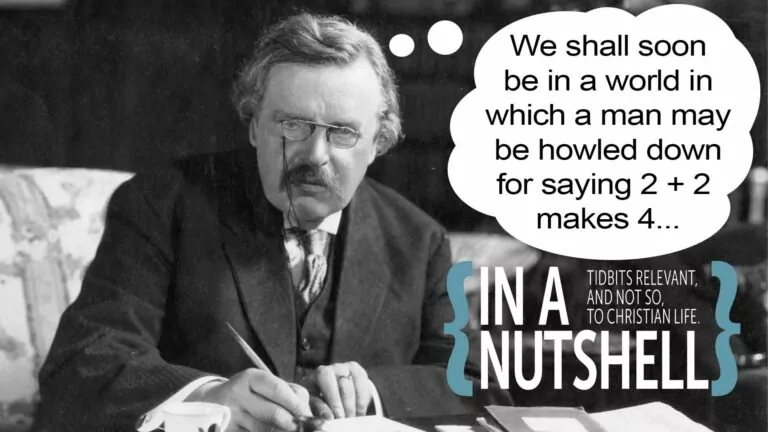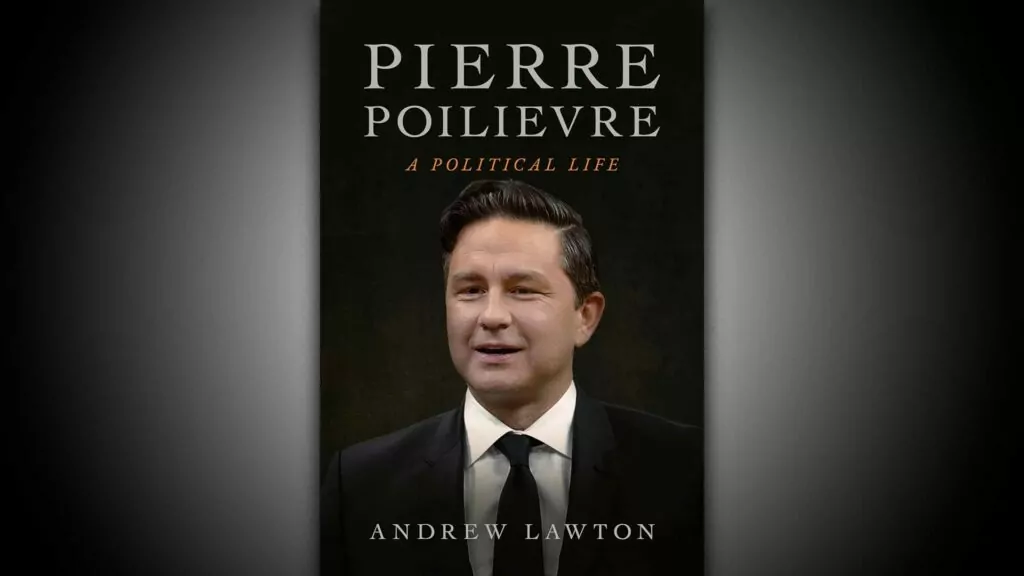Chesterton saw it coming…
A hundred years ago, in the Aug 14, 1926 edition of the Illustrated London News, G.K. Chesterton wrote a column that could be a commentary on our own time. The extreme skepticism that leads some to reject God was going to lead them to reject ever more of the real world.
“The Declaration of Independence, once the charter of democracy, begins by saying that certain things are self-evident. If we were to trace the history of the American mind from Thomas Jefferson to William James, we should find that fewer and fewer things were self-evident, until at last hardly anything is self-evident. So far from it being self-evident to the modern that men are created equal, it is not self-evident that men are created, or even that men are men. They are sometimes supposed to be monkeys muddling through a transition stage before the Superman. But there is not only doubt about mystical things; not even only about moral things. There is most doubt of all about rational things. I do not mean that I feel these doubts, either rational or mystical; but I mean that a sufficient number of modern people feel them to make unanimity an absurd assumption. Reason was self-evident before Pragmatism. Mathematics were self-evident before Einstein. But this scepticism is throwing thousands into a condition of doubt, not about occult but about obvious things. We shall soon be in a world in which a man may be howled down for saying that two and two make four, in which furious party cries will be raised against anybody who says that cows have horns, in which people will persecute the heresy of calling a triangle a three-sided figure, and hang a man for maddening a mob with the news that grass is green.
Thomas Sowell on those who can’t, critiquing those who do
“The beauty of doing nothing is that you can do it perfectly. Only when you do something is it almost impossible to do it without mistakes. Therefore people who are contributing nothing to society, except their constant criticisms, can feel both intellectually and morally superior.”
Secular isn’t a synonym for neutral
“It turns out that, however you might wish otherwise, you eventually wind up wherever it was you were going. If you get on the plane to Chicago, and I would ask you to follow me closely here, you are going to land in Chicago. We are now arriving where a godless education must necessarily go. The public schools in America were not secular, they were godless. The public schools in America were not neutral, they were godless. The public schools in America were not even agnostic, they were godless.”
– Douglas Wilson
Wit and wisdom of Benjamin Franklin
While best known as one of America’s Founding Fathers, Benjamin Franklin was also a printer, postmaster, scientist, diplomat, and inventor. On top of all that, he had quite the reputation as a public wit, spouting such well-known aphorisms as “Three may keep a secret if two of them are dead,“ “Fish and visitors stink after three days,“ and “Love your enemies, for they tell you your faults.”
While he was likely not Christian (he seemed to deny Christ’s deity) many of his common-sense witticisms have some depth to them. Might it be because he was riffing off of the inspired Word? What follows are a few Franklin selections paired with texts that say something similar. Is the connection real or imagined?
“Well done is better than well said.”
“Do not merely listen to the word, and so deceive yourselves. Do what it says.” – James 1:22
“Fools need advice most, but wise men only are the better for it.”
“The way of fools seems right to them, but the wise listen to advice.” – Prov 12:15
“He’s a fool that cannot conceal his wisdom.”
“A prudent person conceals knowledge, but the heart of fools proclaims foolishness.” – Prov 12:23
“He that lies down with dogs, shall arise with fleas.”
“One who walks with wise people will be wise, but a companion of fools will suffer harm.” – Prov. 13:20
“Search others for their virtues, thy self for thy vices.”
“…in humility count others more significant than yourselves.” –Philippians 2:3
Lyric of the month
This might be an oldie but it is a real goodie from the Newsboys:
Born to sin / and then get caught.
All our good deeds / don’t mean squat.
Sell the Volvo / shred the Visa,
send the cash to Ma Teresa.
Great idea / the only catch is
you don’t get saved / on merit badges.
Doctor’s coming / looking grim:
“Do you have a favorite hymn?”
Check your balance through the years,
All accounts are in arrears.
Guilt is bitter. / Grace is sweet.
Park it here / on the Mercy Seat.
When we don’t get what we deserve,
that’s a real good thing.
When we get what we don’t deserve,
that’s a real good thing.
Why is only the other side quoting the Bible?
 In US politics one party is still acknowledging God’s Word as authoritative. And it’s not the Republicans. In an October debate with Florida governor Ron DeSantis, Democratic challenger Charlie Crist alluded to both Matthew 7:1 and 7:12 to, blasphemously, defend abortion and to justify allowing double mastectomies and other genital mutilations on children.
In US politics one party is still acknowledging God’s Word as authoritative. And it’s not the Republicans. In an October debate with Florida governor Ron DeSantis, Democratic challenger Charlie Crist alluded to both Matthew 7:1 and 7:12 to, blasphemously, defend abortion and to justify allowing double mastectomies and other genital mutilations on children.
“I believe that we need to do unto others as we would have them do unto us. It’s called the Golden Rule…. we’re all children of God. And that doesn’t mean that you [DeSantis] are the one who’s supposed to judge what others are supposed to do, particularly women, with their bodies.”
A month earlier, another prominent Democrat, California governor Gavin Newsom, ran billboards in Mississippi and Oklahoma that read: “Need an abortion? California is ready to help.” This offer of abortion was justified with Mark 12:31, included underneath, which reads “Love your neighbor as yourself. There is no greater commandment than these.”
Such mangling of the Bible for political purposes is nothing new of course. In the 2004 presidential campaign, the Democratic contender, John Kerry, called “Honor your Father and your Mother…one of the oldest Commandments” seemingly unaware that God gave all Ten Commandments at the same time.
But even as Democrats continue to cite the Bible, it’s worth considering, why does it increasingly seem that the only folks willing to quote God’s Word are the murderers and mutilators? They do so blasphemously, taking God’s Words in vain… but in a strange way they, at least, are treating God’s Word as both relevant and authoritative in the public sphere.
Hit back?
It is a Christian parent’s repeated role to explain to their pint-size progeny that Jesus did not tell us to“do unto others as they did to us.” But, as Greg Koukl recently pointed out, there can come a time in debate or discussion when that is good advice – you may need to give as good as you got.
It is the appropriate response when someone tries to pin you with what’s called the “Kafka Trap.” In his novel The Trial, Franz Kafka presented a Soviet-style interrogation where the denial of something would be presented as proof of guilt. So, for example:
I think you have a drug addiction
What? I do not!
That just proves it – drug addicts always deny it!
Today this Trap is most often used to accuse people of racism: if you deny you’re racist, that just proves that you are. When you’re hit with this you’re-hooped-either-way attack, Greg Koukl offers this tactic: do unto them as they’ve done to you
…accept his approach, then turn the Kafka trap back on him. Here’s an example:
“I knew you’d say that, and I’m glad you did.”
“What! Why?”
“Because it proves you’re wrong.”
“Huh?”
“No one says that unless they’re mistaken. Don’t you see it?”
“No.”
“That’s even more proof you’re wrong. Sorry.”
Or…
“Do you know what ‘social justice’ means?”
“Of course I do.”
“That proves you don’t. No one who really understands social justice thinks he understands it.”
Doing to others as they’ve done to you isn’t wrong here because this isn’t about revenge, but rather clarity. You’re exposing them for just how insubstantial their rhetoric really is.
Coaches with a parenting tip for us all
It’s said that practice makes better… but better at what? A basketball player that practices badly will engrain those bad habits. Then, whatever he might be doing wrong, whether it’s a high dribble, or putting no arc on his shot – he’ll actually get more consistently bad by practicing at it.
And parents, the same is true for our children: if they’re mouthing off with regularity, or responding with the right words but the wrong tone, they are practicing being bad. And if that’s left uncorrected then they’ll get really good at being bad… especially when they hit the teen years. So just as it is important to practice basketball the right way, our kids need to not just say the words, but practice saying them the right way… lest they be practicing and reinforcing and engraining the wrong way.
Free vs. free
“There are constant calls from NDP candidates and MPs for free post-secondary tuition, free childcare, free dental care, free drugs (both pharmaceutical and recreational), free housing, free wifi . . . even free money (Universal Basic Income). The only thing they don’t want free is ‘dom’ . . . (as in freedom). They don’t want a free press. They don’t want free speech. They don’t want parents free to raise their children as they see fit. They don’t want a free conscience. They don’t want free thinkers at universities.
– Christian Heritage Party leader Rod Taylor, “Socialism …on the Instalment Plan”















